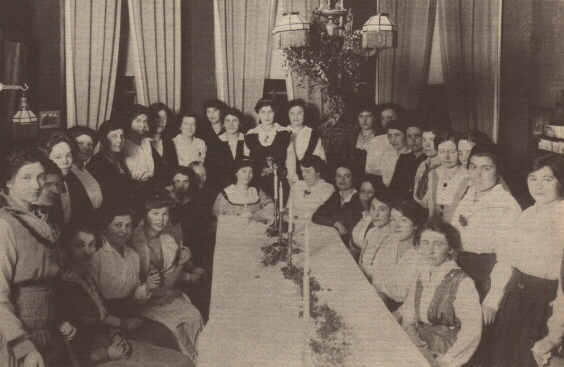| This period in Ann Arbor's religious history, bounded
by the two world wars, marks significant changes in the way people expressed
their faith and drew from their religious teachings. Still evident are
the hard times, too, which affected Americans nationwide as the first World
War, the Depression, and immigration events in world history at this time
are uniquely reflected in Ann Arbor, simultaneously, the city's philanthropic
churches, groups and organizations used their platforms for proclaiming
new moral and political ideas. |
|
| Religious contributions were important during these economically
trying war years. After a decade of trying to raise sufficient funds, the
Young Men's Christian Association, or Y.M.C.A., began to develop. Noting
the Y's location on Fifth Street, one can imagine how the building's size
offered the young boys and young men of the community ample room for exercise
and social recreation. The organization brought needed skills to the community
youth at a time when resources were scarce (Stephenson, p.394-399) For
the women of the community, the organization of the Y.W.C.A. - the Women's
Association - proved to be a much-needed place for participating in recreation
and home skills (ibid., p. 397) This description of both the men's and
women's organizations might seem stereotyped and gender-biased; the Y appealed
to the once-accepted behavior of men to desire sports and women to fancy
classes in cooking and sewing (p. 398.) However, as the associations grew
in support (by both religious and non-religious benefactors), they were
able to provide job placement services to unemployed men and women. In
fact, the Y.W.C.A. often housed lone female travelers who needed a respectable
place to stay while pursuing work, education or travel opportunities away
from home. The Young Men's and Women's Christian Associations appear to
have served as a community center for youth who simply needed academic,
social and career direction when their schools, churches and families could
not meet these needs. Open libraries, warm places to chat with friends
and athletic equipment were always waiting for the city's young people.
Thus, the early Y.M. and Y.W.C.A. represented more than just a charitable
outreach: they were community gathering places. |
|
| In spite of the community's charitable efforts during
the Years of the First World War, it is said that social ills pervaded
the Ann Arbor streets. This was a (perhaps exaggerated) observation made
by the Social Purity Club - a group composed of twelve women's organizations
in the Ann Arbor area. These women worked especially hard to deter the
sale of alcohol to minors, and to provide education in sex hygiene to schools
and homes (Marwil, p. 86.) Such attention to the personal conduct of Ann
Arbor's young ladies developed as a result of a perhaps exaggerated study
by Agnes Inglis, a local social worker, who purportedly even set up a home
for pregnant unwed mothers. |
|
| Like the Prohibition
movement, the Rotary and Kiwanis Clubs represent a shift from religious
influence on wholesome city living to the community's moral welfare becoming
a secular concern. Much like the Y.M.C.A., these social and humanitarian
groups consisted of people who had a heart for making the city a safe,
sufficient place for people to live. With boards consisting of the city's
economic and governmental leaders, the clubs gave charitable Ann Arborites
a means to contribute to the community, and unlike religious organizations,
many different people were able to come together for the sake of doing
good (from Marwil and Stephenson.) |
|
| With the United States' declaration of World War on April
6, 1917, Ann Arbor's German community was slowly brought under suspicion
for having patriotic ties to their homeland. A clergyman, the Reverend
L. A.. Barrett of the Presbyterian Church, boldly accused the religious
- and, no doubt, patriotic - sympathies of the ethnically-German residents.
Like the Civil War, however, the first World War was another opportunity
for German-Americans - and other groups facing discrimination - a chance
to fight for American values and ideas: political freedom, religious freedom,
and "democracy" for all (Marwil, p.98.) |
|
| The Greek
community, although small at this time, also felt the struggles of
war time. Like the Germans, the Greeks had fled their homeland for religious
and political freedom in the United States. Unfortunately, the Greeks also
had their share of discrimination and hard times (Marwil, pp. 99-101.)
In his writings, Ann Arborite Tony Preketes recalls being taunted with
chants of "Greek boy, Greek boy," at school; in the workplace, like the
Hoover plant, strikers and troublemakers
were assumed to be foreigners. |
|

